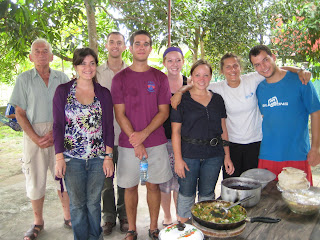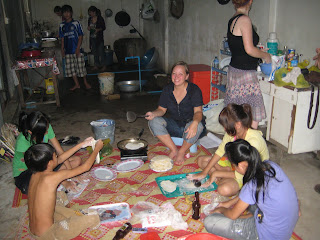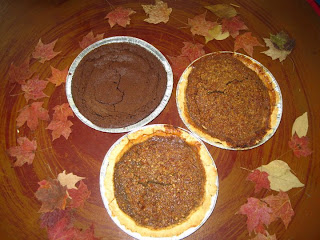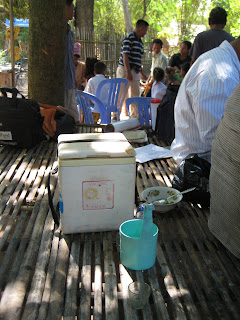I'm going to start talking about traffic in Cambodia more because it is vastly different from traffic in America.
Here's an interesting article about the high frequency of traffic fatalities in Cambodia:
http://www.voanews.com/english/news/asia/Cambodias-Traffic-Casualties-Expected-to-Climb-Despite-New-Safety-Laws--108392894.html
It's definitely true speeding and drunk driving are problems, but I don't think 80% of people wear helmets during the day, at least in the countryside.
Tomorrow, I'll show you what a Cambodia highway looks like, so stay tuned.
Saturday, November 20, 2010
Wednesday, November 17, 2010
Newborn baby

Isn't he cute? This is a teacher at my school's new baby. He is three days old in this picture.
Notice the pile of money to the left of his head. When people come to see the baby, they give some money and wish the baby good health and happiness.
Usually, the men will also have a drinking party with the father while the mother rests and female relatives take care of everything. The mother does not get to rest at the hospital and has to come back with the baby on the same day as the birth. So, she relies on relatives to take care of her.
Tuesday, November 16, 2010
Interesting things said today:
1. One of my really strong English students asked me what the opposite of democracy was. I told him dictatorship. After discussing the word, he told me the Khmer word for dictatorship: communiss (I think it’s French since a lot of technical words in Khmer come from French or English). In America, we generally associate communism with dictatorship, but my student skipped all the details, as I imagine many Cambodians do. On the other hand, I’ve spoken to Cambodians who think communism is great. One friendly guy in a taxi to Phnom Penh couldn’t stop talking about how great everything was in Bulgaria when he was there in the 1980’s.
2. At a wedding tonight, everyone sitting at my table pointed out that there was another non-Asian person at another table. “Like Jeremy,” they said, but literally the only thing I had in common with this guy physically was that I wasn’t Asian. Can you imagine being at an American wedding and telling a minority that there is another minority at another table?
1. One of my really strong English students asked me what the opposite of democracy was. I told him dictatorship. After discussing the word, he told me the Khmer word for dictatorship: communiss (I think it’s French since a lot of technical words in Khmer come from French or English). In America, we generally associate communism with dictatorship, but my student skipped all the details, as I imagine many Cambodians do. On the other hand, I’ve spoken to Cambodians who think communism is great. One friendly guy in a taxi to Phnom Penh couldn’t stop talking about how great everything was in Bulgaria when he was there in the 1980’s.
2. At a wedding tonight, everyone sitting at my table pointed out that there was another non-Asian person at another table. “Like Jeremy,” they said, but literally the only thing I had in common with this guy physically was that I wasn’t Asian. Can you imagine being at an American wedding and telling a minority that there is another minority at another table?
Saturday, November 13, 2010
Thanksgiving in Cambodia
American holidays give us a little taste of home. Celebrating Thanksgiving together has become a tradition for the Peace Corps Volunteers working in my province. However, our Thanksgiving was far from traditional.
Since they don't celebrate Thanksgiving here, there are no days off for it. So, we celebrated it a bit early. Thanksgiving ingredients are also not easily accessible. And, unlike volunteers in another province, we did not want to go through the trouble of buying our own turkey($12) and killing it ourselves.
By not being traditional about our Thanksgiving, we were able to enhance it. Rather than only enjoying one meal, we cooked and feasted all day and shared our food with my friend's Cambodian host family.
Breakfast included orange juice, a delicious egg scramble and banana pancakes.

Lunch was Mexican food (very American, I know). Here's us with some of the food:

We rolled the tortillas with beer cans.

And then we made pies and brownies for dessert in the late afternoon. The leaves were mailed by the family of another volunteer and kept in an envelope.

To make the pies and brownies, we went down the street to use a local bread oven. When I asked about the temperature of the oven, the young girl told me it was "hot enough." The high tech oven:

So, which looks more tasty: our American food or traditional Cambodian fish paste (prohok), which I am still mostly unable to eat?

Since they don't celebrate Thanksgiving here, there are no days off for it. So, we celebrated it a bit early. Thanksgiving ingredients are also not easily accessible. And, unlike volunteers in another province, we did not want to go through the trouble of buying our own turkey($12) and killing it ourselves.
By not being traditional about our Thanksgiving, we were able to enhance it. Rather than only enjoying one meal, we cooked and feasted all day and shared our food with my friend's Cambodian host family.
Breakfast included orange juice, a delicious egg scramble and banana pancakes.

Lunch was Mexican food (very American, I know). Here's us with some of the food:

We rolled the tortillas with beer cans.

And then we made pies and brownies for dessert in the late afternoon. The leaves were mailed by the family of another volunteer and kept in an envelope.

To make the pies and brownies, we went down the street to use a local bread oven. When I asked about the temperature of the oven, the young girl told me it was "hot enough." The high tech oven:

So, which looks more tasty: our American food or traditional Cambodian fish paste (prohok), which I am still mostly unable to eat?

Wednesday, November 10, 2010
Drinking during the day
This morning, I went to the countryside with the nurses. They gave out Vitamin A and gave vaccinations and I gave a health presentation.
The nurses giving medicine:

If you look closely at the picture, you can see a shot glass and a container of rice wine next to the medical kit:

In between repeating the announcement for villagers to bring their children to see the nurses, the village chief would take shots of rice wine with some friends. It was only 10 am at this point. Yet, no one looked twice, as it is not abnormal for a community leader to knock back a few shots in the morning, even while organizing a local event.
To the village chief's credit, he was helpful to me during my presentation. He read some documents I brought and helped me interact with the audience.
While he was behaving poorly by drinking, he was promoting good health during my presentation. I've learned to accept the positive things people can offer me here, even when they do things I would consider unacceptable in America.
The nurses giving medicine:

If you look closely at the picture, you can see a shot glass and a container of rice wine next to the medical kit:

In between repeating the announcement for villagers to bring their children to see the nurses, the village chief would take shots of rice wine with some friends. It was only 10 am at this point. Yet, no one looked twice, as it is not abnormal for a community leader to knock back a few shots in the morning, even while organizing a local event.
To the village chief's credit, he was helpful to me during my presentation. He read some documents I brought and helped me interact with the audience.
While he was behaving poorly by drinking, he was promoting good health during my presentation. I've learned to accept the positive things people can offer me here, even when they do things I would consider unacceptable in America.
Tuesday, November 9, 2010
Have you eaten rice yet?
Last time I spoke about how often I’m asked about my salary and money. This is common for people wanting to get to know me. As for people who already know me or just being friendly, they always ask if I’ve eaten rice yet. I think it’s the most common question in Cambodia. The question actually translates into “have you eaten rice already or not yet?” And then you answer with “already” or “not yet.”
This neighbor asks me every morning if I've eaten rice yet:

The assumption is that eating rice is inevitable. Cambodians typically eat rice almost every meal and when they are not eating rice, they eat noodles or cake made from rice. At a restaurant, the rice has some food on top of it. If they are eating as a family, they have a bowl of rice and a one or two dishes of fish or meat and vegetables in the middle of the table. They assume that westerners do the same thing, but eat bread instead of rice.
Here are my host-brothers having dinner. In the background, other family members are watching TV:

Statistic of the day: 100-400 million. This is the range of guesses of the global population by the students who I taught geography to today.
This neighbor asks me every morning if I've eaten rice yet:

The assumption is that eating rice is inevitable. Cambodians typically eat rice almost every meal and when they are not eating rice, they eat noodles or cake made from rice. At a restaurant, the rice has some food on top of it. If they are eating as a family, they have a bowl of rice and a one or two dishes of fish or meat and vegetables in the middle of the table. They assume that westerners do the same thing, but eat bread instead of rice.
Here are my host-brothers having dinner. In the background, other family members are watching TV:

Statistic of the day: 100-400 million. This is the range of guesses of the global population by the students who I taught geography to today.
Monday, November 8, 2010
I can’t stress enough how often I’m asked about money and marriage. Here are highlights of three typical conversations from the last two days:
1.When returning from Phnom Penh, I need to take a ferry across the Mekong River. While waiting for the ferry, all the travelers are swarmed by sellers and beggars. I usually take this time to stretch my legs after sharing a vehicle with way too many people.
Last time I was stretching my legs, I got curious about a basket a woman had on her head. I asked the seller and she told me they were frogs. Two other sellers then realized I could speak Khmer and started asking me the usual questions – what’s my nationality, how long have I been in Cambodia, what am I doing here etc.
Then the question turned to marriage and one of the other women asked me if I “wanted” the frog seller. I said no, but she persisted that she would make beautiful children for me. I politely said no thanks.
2.Two or three policemen “patrol” the corner near my house where the dirt road meets the highway. They usually just stand around while nearly everyone who rides by on a motorbike breaks the law by not wearing a helmet. I speak to them a lot when I’m on my way to school.
During our conversation today, they asked me what I will do when I go back to America (most people assume that I don’t actually have to look for a job, I’ll just automatically have one). I always say I want to be a teacher. Then they asked how much teachers make and told me, unsolicited, that they only make $70 a month and wanted to know what police make in America. They were shocked that I didn’t know.
They also asked me when I’ll be getting married. I said maybe in three of four years and they said I would be too old. Then they suggested I get a Khmer wife.
3.At school, two female students I don’t know came to talk to me. After asking me how many siblings I have, and commenting on my Khmer language ability, they asked me how much money I spend in a month. Then one of the girls asked me in English, “doesn’t you married yet?” I said no, I'm only 24. But, she said I was so old and should get married.
So here I am, 24 years old, not married and I don’t know how much money police in America earn in a month.
1.When returning from Phnom Penh, I need to take a ferry across the Mekong River. While waiting for the ferry, all the travelers are swarmed by sellers and beggars. I usually take this time to stretch my legs after sharing a vehicle with way too many people.
Last time I was stretching my legs, I got curious about a basket a woman had on her head. I asked the seller and she told me they were frogs. Two other sellers then realized I could speak Khmer and started asking me the usual questions – what’s my nationality, how long have I been in Cambodia, what am I doing here etc.
Then the question turned to marriage and one of the other women asked me if I “wanted” the frog seller. I said no, but she persisted that she would make beautiful children for me. I politely said no thanks.
2.Two or three policemen “patrol” the corner near my house where the dirt road meets the highway. They usually just stand around while nearly everyone who rides by on a motorbike breaks the law by not wearing a helmet. I speak to them a lot when I’m on my way to school.
During our conversation today, they asked me what I will do when I go back to America (most people assume that I don’t actually have to look for a job, I’ll just automatically have one). I always say I want to be a teacher. Then they asked how much teachers make and told me, unsolicited, that they only make $70 a month and wanted to know what police make in America. They were shocked that I didn’t know.
They also asked me when I’ll be getting married. I said maybe in three of four years and they said I would be too old. Then they suggested I get a Khmer wife.
3.At school, two female students I don’t know came to talk to me. After asking me how many siblings I have, and commenting on my Khmer language ability, they asked me how much money I spend in a month. Then one of the girls asked me in English, “doesn’t you married yet?” I said no, I'm only 24. But, she said I was so old and should get married.
So here I am, 24 years old, not married and I don’t know how much money police in America earn in a month.
Subscribe to:
Comments (Atom)